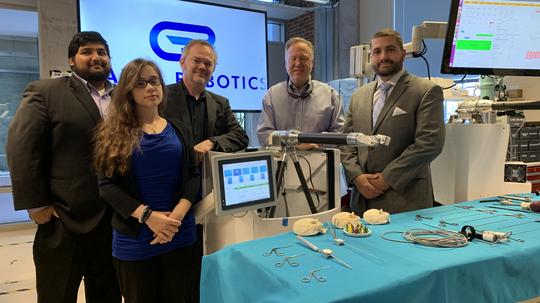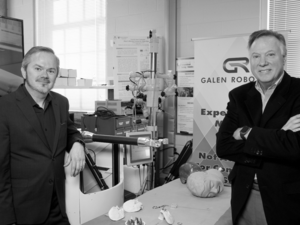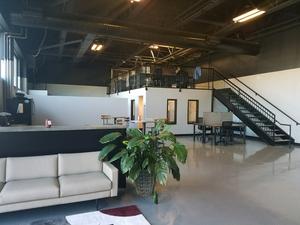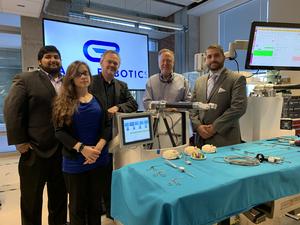
Galen Robotics is hoping to earn federal approval to get its surgical robot into operating rooms next year, with plans to sell it through a payment model that will make it more affordable for cash-strapped hospitals.
The Baltimore startup is planning on using a pay-for-service model. Instead of having a hospital purchase a machine upfront, the company plans to charge hospitals a fee every time the device is used in surgery. A staff member from Galen will also be present during surgeries to make sure the device is working properly.
CEO Bruce Lichorowic hopes the robot can be in around half a dozen hospitals next year. The company filed for U.S. Food and Drug Administration approval for a de novo classification three months ago.
The decision to offer the device with a cheaper upfront cost is due mostly to the Covid-19 pandemic. The pandemic put a strain on the finances of many hospital systems, according to the American Hospital Association, as Covid-19 patients took up a large number of beds and resources. A large portion of hospital revenue comes from elective surgery, which dried up because of the pandemic, Lichorowic said. Since hospitals have less revenue, Lichorowic believes many health care systems don't have the resources to make a large upfront investment in a new product.
A fee-per-use model reduces the short-term expenses for a hospital compared to the massive upfront cost of a new medical device.
“We are really sharing the risk with the hospital,” Lichorowic said. “We're betting that your surgeons are going to use this versus it sitting in the hallway.”
Galen’s robot is almost akin to power steering on a car; physicians control every movement made by the robot, but the device helps stabilize the physician's hands to improve accuracy. The robot is able to hold medical instruments that are already in use, so it does not require a large amount of specialized equipment. Eventually, Galen hopes to collect data on the movements of the robot during surgery to be used as a training tool in medical schools. Lichorowic said the company could also implement navigation software, augmented reality and other additions once the robot has proved its utility in the market.
“We're really a software company that just happens to be selling a robot.” Lichorowic said.
The Galen robot is made to be used on soft tissue or very tiny bones, compared to a lot of other medical robots that focus on hip and knee replacements. The technology will first be used for throat surgery where physicians have to work within a very narrow corridor. The advantage of working within natural openings of the ear, nose and throat is that the robot doesn’t have to make any cuts within the skin. Lichorowic hopes to move into neurosurgery and other fields in the future.
Galen completed a $15 million oversubscribed series A round earlier this year, and is hoping to raise around $5 million in a second close. Galen Robotics began in Silicon Valley, but moved to Baltimore in part because of incentives from the Maryland Department of Commerce. The company is now based in Pigtown at 1100 Wicomico, which is located in an opportunity zone that provides federal tax incentives. Before moving to Pigtown, Galen Robotics was based at the LaunchPort Medtech accelerator in Port Covington.










